Key takeaways
- Political polarization is deeply intertwined with identity, making compromise feel like a loss of self and deepening divides beyond simple political disagreements.
- US political podcasts highlight the emotional dynamics of political conversations, often reinforcing echo chambers while also providing opportunities for nuanced understanding.
- The impact of polarization extends beyond politics, affecting social relationships and creating an us-versus-them mentality that undermines community cohesion.
- Recognizing personal biases and fostering empathy through storytelling in podcasts can be key to bridging divides and promoting constructive dialogue.
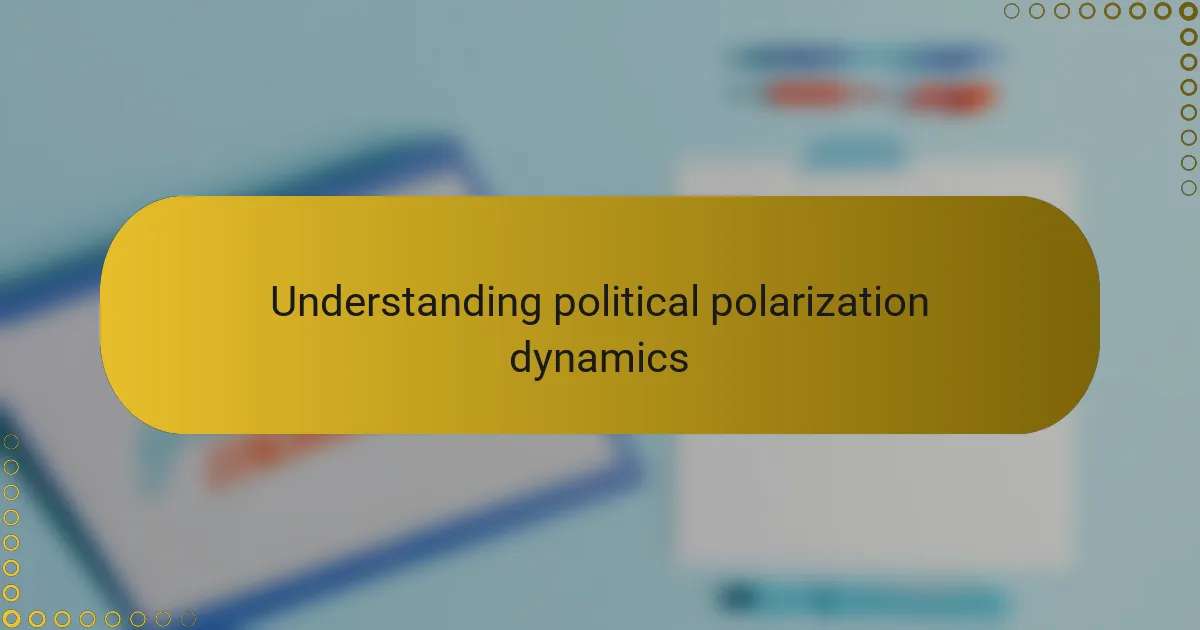
Understanding political polarization dynamics
Political polarization isn’t just about differing opinions; it feels like an emotional divide that changes how we see each other. I remember times when conversations with friends shifted from friendly debates to defensive standoffs—why does disagreement sometimes feel like a personal attack? This emotional layer, I think, is what deepens the divide beyond mere political viewpoints.
Looking closer, I’ve noticed polarization dynamics often stem from how information flows and how identities become wrapped up in politics. When people start viewing political beliefs as core to who they are, isn’t it natural that compromise feels like losing part of themselves? It made me realize that polarization isn’t just a political problem—it’s a human one.
Have you ever wondered why it’s so hard to find common ground, even on basic issues? My experience shows that polarization thrives not just on policy disagreements but on how these disagreements are amplified online and in media. Understanding these dynamics helps me see that healing divides starts with recognizing these underlying forces, not just surface-level arguments.
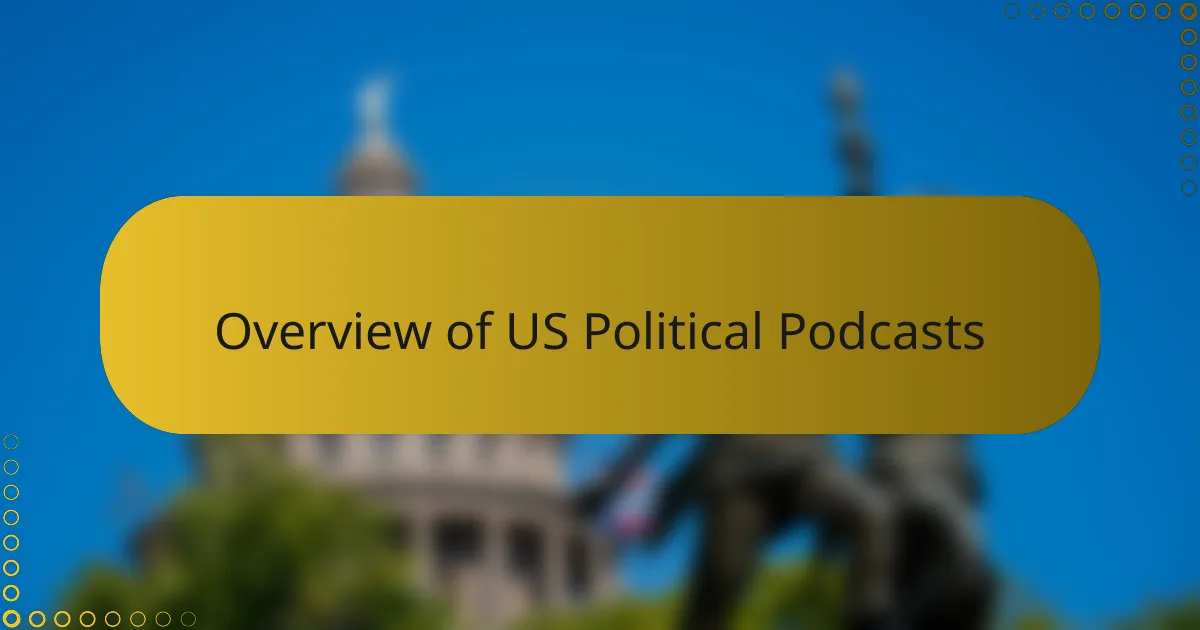
Overview of US political podcasts
US political podcasts have become a fascinating mirror of our divided times. I often find myself tuning into different shows, noticing how some podcasts lean sharply left or right, while others strive to bridge gaps. Have you ever caught yourself getting drawn into not just the content, but the tone and passion behind these voices?
What strikes me is how these podcasts don’t just report news—they create communities. Listening to them, I felt both connected and sometimes more isolated, depending on whether the host’s worldview aligned with mine. It’s like stepping into a room where everyone shares your political colors, which can be comforting yet limiting.
I wonder if this podcast landscape widens our perspectives or just reinforces our bubbles? From my experience, the sheer variety means there’s potential for dialogue—if we choose to listen beyond our echo chambers. But often, it feels easier to stay within familiar narratives rather than challenge our own beliefs.
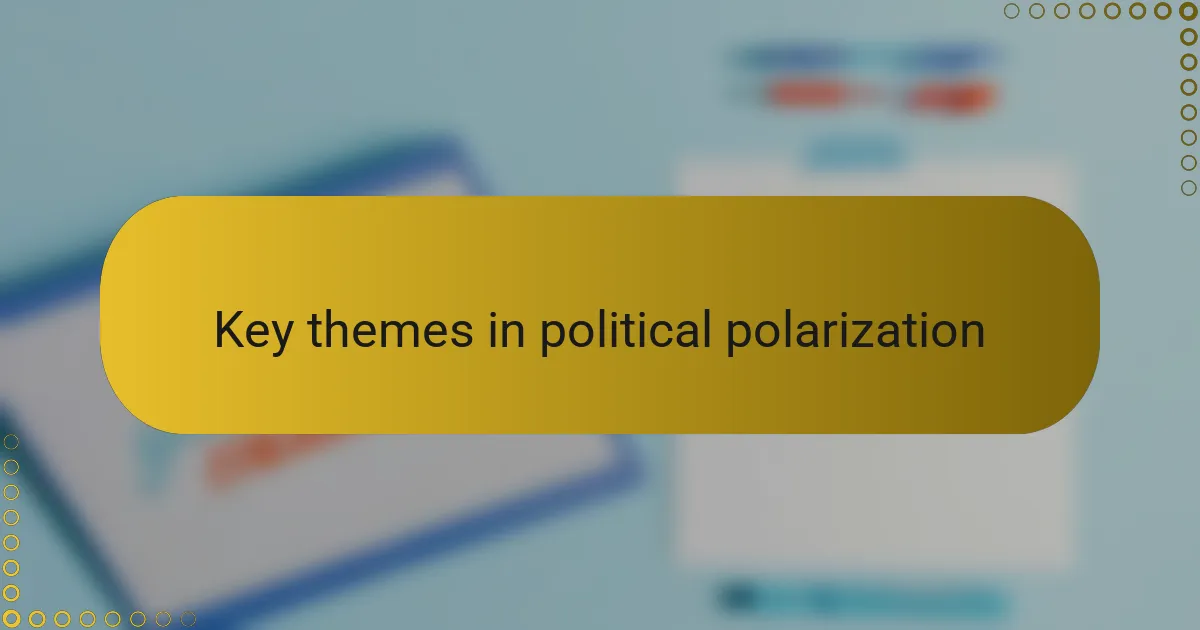
Key themes in political polarization
When I think about the main themes in political polarization, identity stands out the most. It’s not just about policy anymore; it feels like people’s sense of self is on the line. Have you noticed how political labels can become almost tribal, making any disagreement feel like a betrayal? That shift from politics as discussion to politics as identity really shapes how deep the divide gets.
Another theme that caught my attention is the role of media and information bubbles. I’ve seen firsthand how algorithms push us toward content that reaffirms what we already believe. Doesn’t this make it harder to even understand the other side? It seems polarization feeds on these echo chambers, turning small disagreements into huge chasms.
Finally, I keep coming back to emotion as a key theme. Politics has become highly charged, with fear and anger often driving reactions more than facts. It reminds me of times when I’ve caught myself reacting emotionally before fully considering another perspective. How can we hope to bridge divides if emotions keep overpowering rational dialogue? This emotional intensity feels like the pulse beating at the heart of polarization.
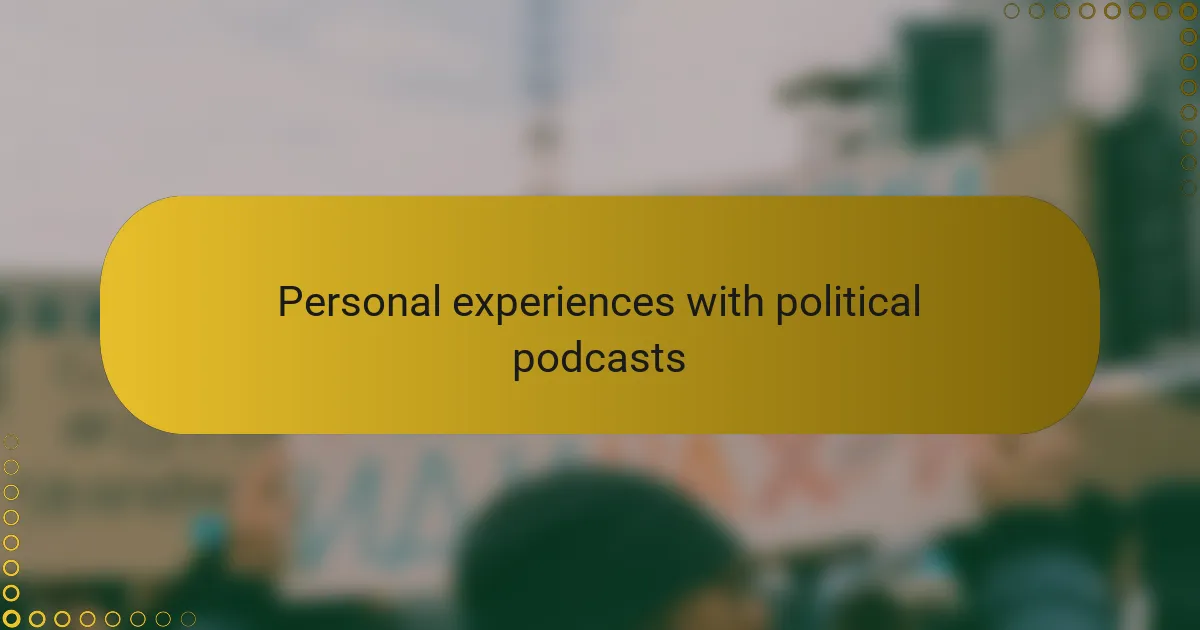
Personal experiences with political podcasts
I’ve spent countless hours listening to political podcasts, and what surprised me most was how deeply they influenced my own perspective. Sometimes, a host’s passionate storytelling made me rethink my stance, while other times, it just confirmed the biases I wasn’t fully aware I held. Have you ever felt caught between appreciating a thoughtful argument and resisting it because it challenges your core beliefs?
One episode particularly stuck with me: a conversation where the hosts openly admitted their struggles with hearing opposing views without getting defensive. It felt refreshing to hear vulnerability in such a polarized space. That honesty made me realize that political podcasts aren’t just about debate—they’re about wrestling with complexity and admitting uncertainty, something we rarely see in mainstream media.
Yet, I also noticed how easy it is to slip into listening only to voices that echo my views. There was a period when I only tuned into podcasts that aligned with my beliefs, and I could feel myself drifting into a bubble. This made me wonder: Are political podcasts helping us bridge divides, or are they simply reinforcing the walls we need to break down? For me, the answer depends on our willingness to lean into discomfort and listen actively.
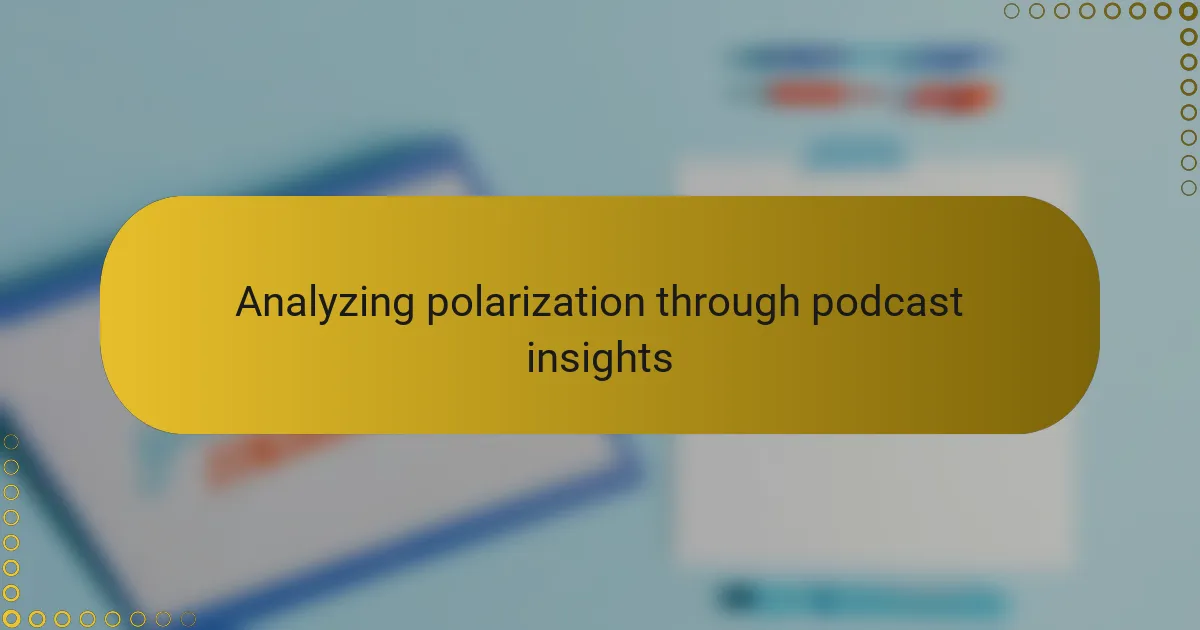
Analyzing polarization through podcast insights
One thing I’ve realized from diving into political podcasts is how they expose the subtle ways polarization plays out—not just in what is said, but how it’s said. I remember an episode where the hosts dissected their own biases openly, which made me think: can acknowledging these biases be the first step toward bridging divides? It feels to me like these candid moments offer a rare glimpse behind the usual partisan noise.
Listening closely to various podcast conversations, I noticed how emotional language often frames political arguments, turning policy debates into personal battles. Have you ever caught yourself getting defensive simply because a host’s tone triggered something inside you? This insight made me see polarization less as a static conflict and more as a dynamic interplay of feelings and narratives that evolve with each exchange.
What I find most compelling is how some podcasts serve as microcosms of our broader political landscape—with hosts and listeners reinforcing group identities, yet occasionally challenging them as well. Through my experience, I’ve come to appreciate that these platforms hold both the risk of deepening divides and the potential for nuanced understanding—depending heavily on the choices we make as listeners to engage openly or retreat into echo chambers.
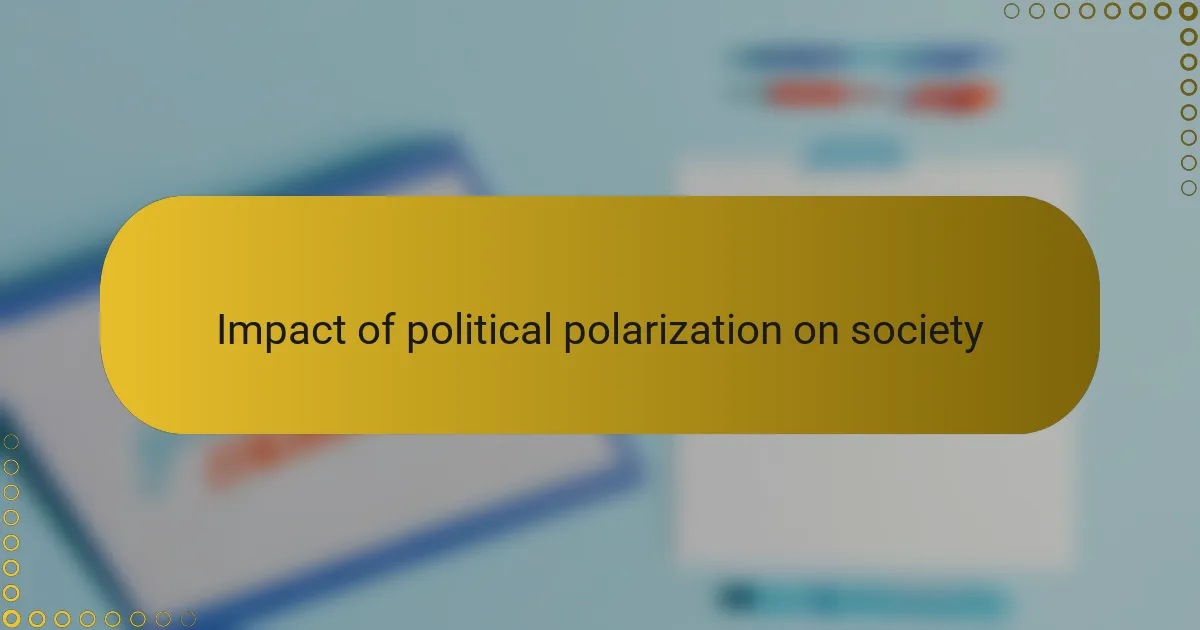
Impact of political polarization on society
The impact of political polarization on society feels like a ripple that reaches far beyond elections. I’ve seen how it fractures communities—even families—turning simple get-togethers into minefields of suspicion or silence. Have you ever noticed how someone’s political stance can suddenly overshadow years of friendship or mutual respect? To me, this shows how polarization doesn’t just divide opinions; it can erode the very fabric of our social connections.
What surprises me is how this divide fosters an us-versus-them mentality that seeps into daily life. It’s as if people start viewing each other not as neighbors or coworkers but as opponents to be defeated. I remember feeling that tension firsthand during a community event, where conversations quickly became charged and guarded. This tribal mindset, I believe, limits our ability to collaborate on shared challenges, making collective progress painfully difficult.
At the same time, polarization seems to fuel an emotional exhaustion that hangs over society. The constant bombardment of conflict leaves many feeling drained or even hopeless. Have you ever found yourself avoiding the news or political talks just to preserve your peace of mind? I’ve been there, and it made me realize how deeply polarization impacts mental wellbeing, shaping not only how we interact but how we experience the world around us.
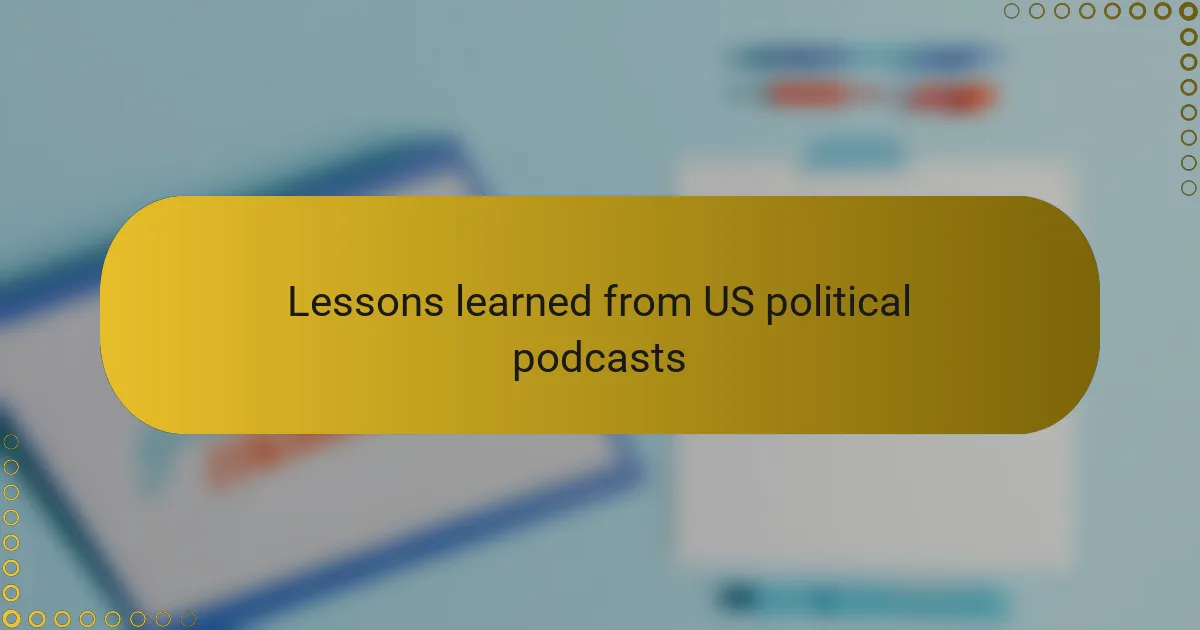
Lessons learned from US political podcasts
What stood out to me most from US political podcasts is how crucial it is to recognize our own biases before trying to understand others. I recall an episode where hosts openly reflected on their blind spots, and it struck me—maybe admitting what we don’t know is the first step toward genuine dialogue. Have you ever caught yourself shutting down before really hearing someone out?
I’ve also noticed that political podcasts teach us the importance of tone and empathy. Listening to conversations where guests share personal stories rather than just policy stats made me realize how much emotion drives political divides. It makes me wonder: Could shifting from confrontation to connection be the real answer to bridging our gaps?
Yet, the podcasts also revealed a double-edged sword. There’s this comfort in tuning into voices that echo our beliefs, but that comfort can quickly turn into an echo chamber. I found myself tempted to stick with familiar views, questioning whether I was truly growing or just reinforcing walls. Do you think political podcasts can help us break free — or do we need to be intentional in how we listen?